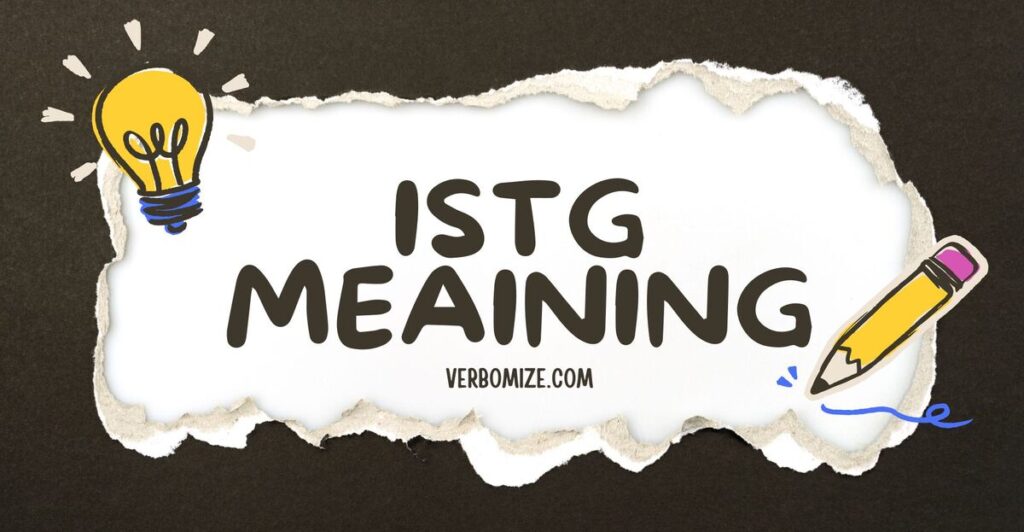Ever see “ISTG” and wonder what it stands for and why it’s popping up everywhere? You’re not alone! Whether you’ve seen it pop up in texts or social media posts, this slang abbreviation is everywhere. If you’ve ever found yourself scratching your head and thinking, “What does ISTG even stand for?”, you’re in the right place.
In this article, we’ll break down the ISTG meaning and show you when and how to use it in everyday conversation. Stick with us, and you’ll be speaking like a digital native in no time! Let’s dive into everything you need to know about this popular phrase.
What Does ISTG Mean?
At its core, ISTG is a shorthand for I swear to God. It’s often used to add emphasis, convey seriousness, or express strong feelings like frustration, excitement, or disbelief. This phrase is commonly used in informal communication, particularly on social media and in text messaging.
Origin and Evolution of ISTG
“I swear to God” has religious origins and is commonly used to emphasize the truthfulness or sincerity of a statement. Over time, as language evolved and digital communication grew in popularity, people started abbreviating phrases like I swear to God into more convenient forms. Hence, ISTG emerged as a quick way to express that same level of sincerity, albeit in a more casual and modern context.
When and How to Use ISTG
Understanding when and how to use ISTG is key to making sure you don’t miscommunicate or unintentionally offend someone. It’s a versatile expression, but its tone, context, and audience all matter.
Casual Conversations with Friends
In casual conversations, ISTG can be used to emphasize something you’re saying. It’s a common way for friends to express how strongly they feel about something. When used in this context, it’s usually playful and light-hearted.
Example:
“I swear to God, you really ate the last slice of pizza?”
Here, the speaker is emphasizing their disbelief or light frustration over the situation, but it’s understood that the tone isn’t too serious.
Expressing Frustration or Annoyance
Another common use of ISTG is to convey frustration or annoyance. When you’ve had enough of something, you might say ISTG to underscore the gravity of your feelings. In this case, it often carries a bit of exaggeration.
Example:
“Swear to God, if I hear that song one more time, I’m gonna snap!”
This usage shows how ISTG can be a way to express an emotionally charged statement, but it’s not necessarily a threat—more of an exaggeration of the speaker’s feelings.
Making a Promise or Threat (Playfully)
Sometimes, ISTG is used to make a promise or a playful threat. While it still adds a layer of seriousness, the overall tone remains lighthearted.
Example:
“ISTG, I will buy you a drink next time we meet.”
In this example, the speaker uses ISTG to make their promise sound more sincere or emphatic. However, it’s clear that they’re not literally swearing to God; they’re just using the phrase for emphasis.
Synonyms and Alternatives to ISTG
If you find yourself using ISTG frequently or if you’re looking to mix things up a bit, there are plenty of synonyms and alternative phrases that convey similar sentiments. Here are a few of the top alternatives:
- “I swear”
This is the most straightforward and common alternative. It has the same meaning but without the religious reference. - “For real”
A more casual way to emphasize sincerity or truthfulness in a statement. - “Seriously”
Often used to indicate that you’re not joking or exaggerating. - “No cap”
A popular slang term used to signal that what you’re saying is entirely truthful or not exaggerated.
These alternatives allow you to keep your language fresh and varied, while still emphasizing sincerity or seriousness in different ways.
Who Uses ISTG?
ISTG is widely used by digital natives—younger generations who have grown up with text messaging, social media, and internet culture. It’s especially common on platforms like Instagram, Twitter, Snapchat, and in group chats. Teenagers and young adults are the primary users, but it’s slowly creeping into more mainstream casual conversations among adults as well.
ISTG is rarely used in professional settings or formal communication due to its casual nature and the potential for misunderstanding or offense. It’s a casual slang term that’s best used with friends, family, and people you know in relaxed situations.
When Not to Use ISTG
While ISTG is a fun and widely accepted expression in informal contexts, it’s important to recognize when it might not be appropriate. Here are some situations where you should avoid using ISTG:
- In Professional Settings:
Slang terms like ISTG are considered unprofessional. Using them in business emails, meetings, or interviews can undermine your credibility or give off the wrong impression. - With Strangers:
If you’re not familiar with someone, it’s best to steer clear of ISTG, as it can be perceived as too casual or even disrespectful. - In Sensitive Conversations:
ISTG may come off as inappropriate in serious discussions, especially if the topic involves religious beliefs, deep personal emotions, or solemn matters. - With Older Generations:
People from older generations may not be as familiar with internet slang. If you’re speaking to someone from a different age group, be mindful of how they might interpret the phrase.
The Cultural Impact of ISTG
The rise of ISTG can be seen as part of a larger trend in digital communication, where shorthand and slang are becoming more normalized. This phenomenon is particularly strong among youth culture, where abbreviations, acronyms, and emoticons rule the day. Just like the way emojis have become a universal language of their own, ISTG plays a role in quick, impactful communication.
ISTG and other abbreviations like LOL, BRB, and YOLO have become integral parts of online culture. This shift toward shorter forms of communication is largely driven by platforms like Twitter, where brevity is prized, and Snapchat, where speed and informality are key. As these platforms evolve, so does the language used on them.
Religious Connotations and Modern Usage
While ISTG originally carried religious undertones due to its connection with swearing by God, its meaning has evolved to become a secular expression in most contexts. The shift from religious affirmation to a casual statement has allowed ISTG to be more widely used without causing offense. However, some individuals may still find the use of God in this expression uncomfortable, especially in more conservative or religious settings.
Responsible Usage of ISTG
It’s essential to understand the responsibility that comes with using slang terms like ISTG. Just as we mind our tone and word choice in face-to-face conversations, we should also consider the implications of our language online.
Be Mindful of Context
Before using ISTG, always think about who you’re talking to and the context of the conversation. Are you in a relaxed setting with friends, or are you speaking to a colleague or acquaintance? While ISTG is widely accepted among younger generations, it can seem inappropriate if used in the wrong context.
Impact on Relationships
Using ISTG too often or in the wrong situations can alter how people perceive you. Overuse of slang can make you sound insincere or overly casual, especially in serious conversations. On the other hand, if you’re too guarded with your language, it may create distance between you and your peers.
Final Thoughts on ISTG
In conclusion, ISTG has become an essential part of online and casual conversation. Whether you’re using it to express sincerity, frustration, or a playful promise, it’s a phrase that can add personality and emphasis to your words. However, like any slang term, it’s important to use it in the right context and be mindful of your audience. By understanding the nuances of ISTG, you can enjoy using it without inadvertently offending anyone or sounding too casual in serious situations.
If you’re ever in doubt, remember that communication is about connection, and knowing when to use certain expressions is a key part of building positive relationships.
FAQs about ISTG
What does ISTG mean?
ISTG stands for I swear to God, often used to add emphasis to a statement or express strong emotions.
Can ISTG be used seriously?
Yes, it can be used to emphasize sincerity, but it’s often more casual or playful in tone, depending on the context.
Is ISTG offensive?
It can be, depending on how and where it’s used. If you’re talking to someone sensitive to religious references, using ISTG could come off as disrespectful.
How is “ISTG” used by Gen Z in conversations?
“ISTG” stands for “I Swear to God” and is commonly used by Gen Z in conversations to emphasize sincerity or frustration. It can express strong feelings or add emphasis to a statement, similar to saying “I’m serious” or “I promise.”

Jone Smith is an experienced blogger and content creator behind Verbo Mize. With a passion for storytelling and insightful commentary, Jone brings a wealth of knowledge on diverse topics. His expertise in blogging, combined with a keen eye for detail, makes his work both informative and engaging, offering readers valuable perspectives on a wide range of subjects.







